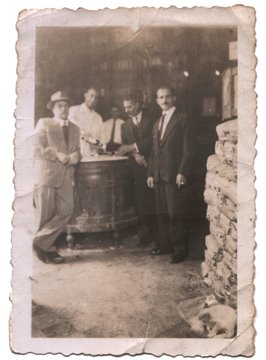 One of my great-uncles, a true good-ol’boy from west Texas, once said to my great-grandmother, “Mamma, it’s hard to find a good woman like you out there.” She replied, “There are plenty of good women like me out there. They just don’t hang out in the places you frequent.” So, you see, snarky flows in my blood, though I draw other lessons from this exchange myself.
One of my great-uncles, a true good-ol’boy from west Texas, once said to my great-grandmother, “Mamma, it’s hard to find a good woman like you out there.” She replied, “There are plenty of good women like me out there. They just don’t hang out in the places you frequent.” So, you see, snarky flows in my blood, though I draw other lessons from this exchange myself.
Everyone is familiar with what some have called “type-scenes” in the literature of a people. Our type-scenes go far beyond literature however, spreading from there with technological advance into radio, then movies, then television, then spawning idiot children on YouTube. A type-scene is a commonly replayed scenario born out of “the way of things” in a given culture and typified in some “literary” form for the entertainment of that community. The readers or viewers recognize the patterns of the scene, anticipate the outcomes, and find great amusement in watching this scenario play out with subtle variations and at times anti-typical results.
For my uncles, the good-ol’boy paradigms of singles bars represented a “way of things” that is replayed with variations in a myriad of American programs. We might also see variations on the ” School Party Run Amuck,” the “Rush to the airport love confession” or the “Make an outlandish public confession of love after blowing it.” We also have the “Love at first sight at a coincidental but spectacular meeting” and the “Rushing to stop a wedding love confession.” Indeed love and our pursuit of it is a frequent theme in our favorite type-scenes.
Well, the ancient Israelites had type-scenes as well. They look different than ours do because the patterns of their lives was different as well, but their enjoyment and development of them was just as great. Over the next few blog posts I’d like to consider one of them and how it is developed in various places in Scripture, culminating theologically, I believe, in the life of Jesus. This type-scene shall be called, “Foreigner at the Well.”
Historically the encounter of women at the well must have been replayed in real life almost every day at a hundred watering holes. As the title suggests, one might imagine them as the singles bars of the ancient near east. It was the job of women to draw water for the family, much as it was the job of men in my growing years to mow the lawn and take out the garbage. Given a rather careful administration of the time of and access to young women in the ancient world, it is easy to imagine that the one place for single young men and single young women to meet-n-greet in a somewhat freer environment would be at the popular hangout spot… the well.
From a literary perspective this scene plays out repeatedly in the Bible. Gary Rendsburg suggests that we have some tellings that establish the standard form of the type scene and others that represent an altered form of this type-scene. For now, let’s consider its standard form, as represented in two texts—Genesis 29:1ff and Exodus 2:16ff.
Jacob flees his father’s house in the face of his brother’s murderous intentions. He travels to his mother’s country. He goes to the well where shepherds are gathered for watering and seeks information about his family. The shepherds say something akin to “Well, what do you know, here comes that guy’s daughter right now!” She draws near with her father’s sheep and Jacob uncaps the well and waters her flocks for her. Jacob falls so instantly in love with Rachel that he disgraces himself by weeping and kissing her. She takes him home to Daddy and the two live happily ever after… sort of.
Moses flees his home in Egypt to escape the murderous intentions of Pharaoh and travels into another country. He goes to a local well where shepherds are mistreating a bunch of woman trying to water their father’s sheep. Moses rises up as the hero and fights off the bad guys. Then draws the water for the women and gives it to their flocks. They take him home to Daddy and he lives happily ever after with one of them… sort of.
The standard pattern seems to be represented in terms of 1. An unmarried foreigner travels to another country. 2. He goes to a local well. 3. He meets the woman who will be his wife.
Seems simple, but so does ours: 1. Man is in love with another man’s fiancée. 2. He repeatedly fails to make the confession or commitment required to make her his wife. 3. He rushes, overcoming many obstacles to prevent her nuptials at the last minute with a confession of undying devotion.
What makes this type-scene so special is the very notion of divine encounter… the seeming randomness of two strangers from different countries having a “chance” encounter at that magical place of chance encounters that results in the creation of a whole people group. It’s romantic; it’s theological; it’s epic; it’s the story of “them” the tellers of the tale and how they came about by divine design working in chance encounters.




